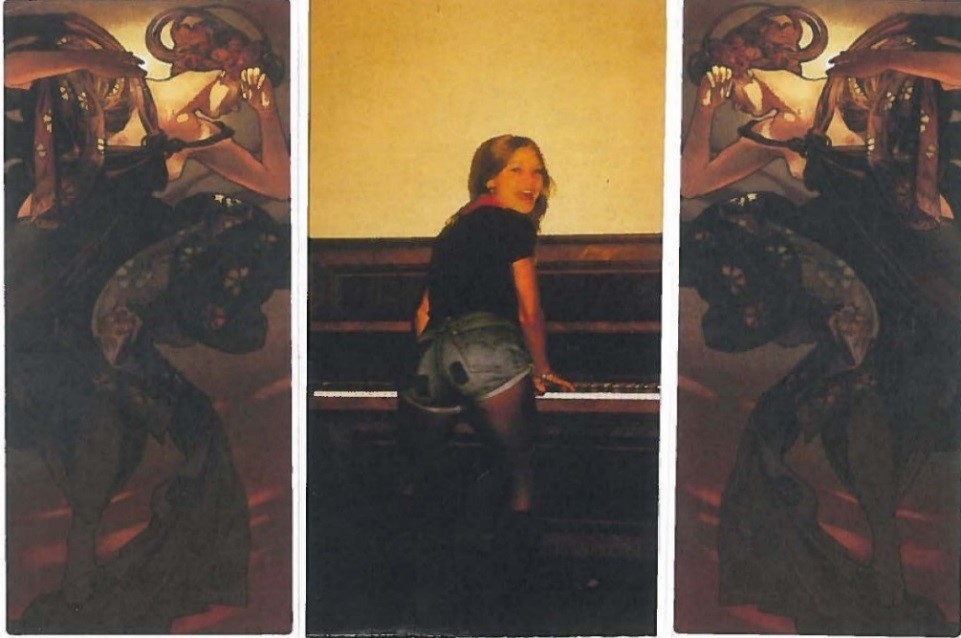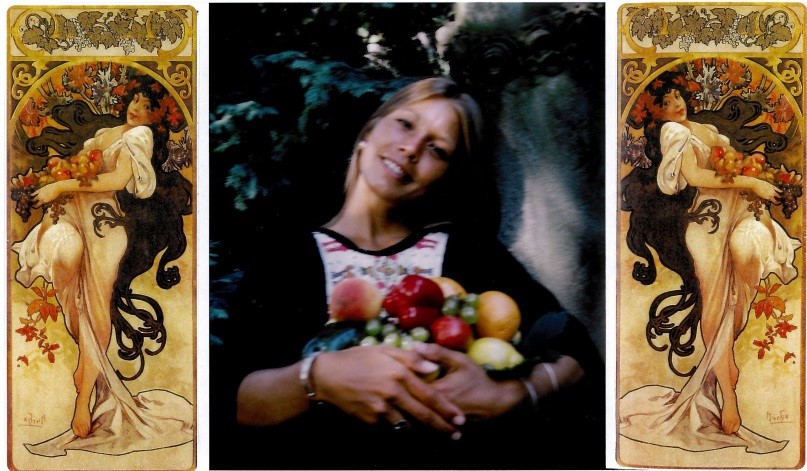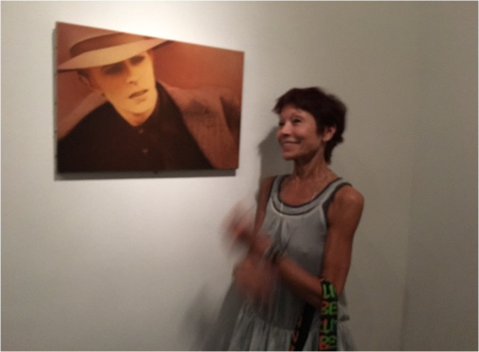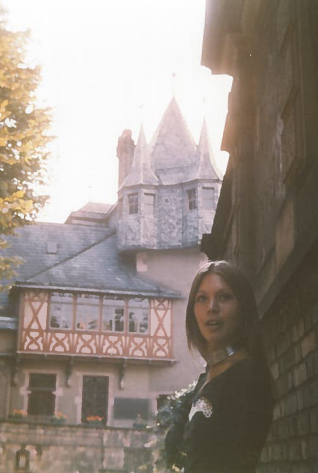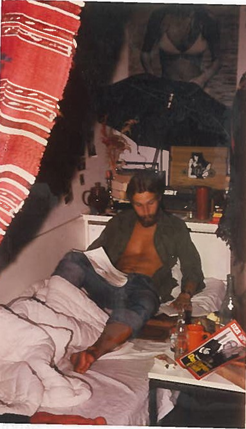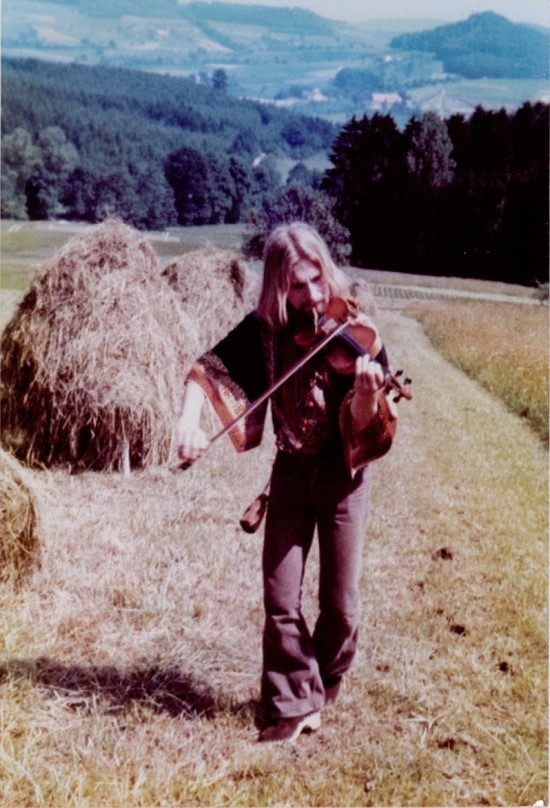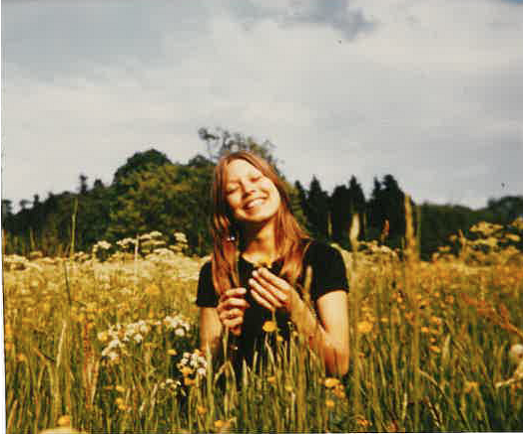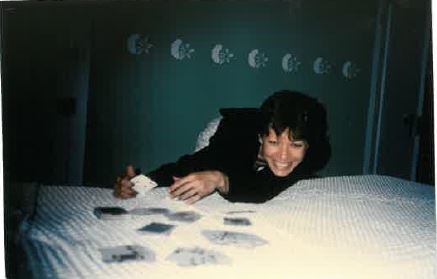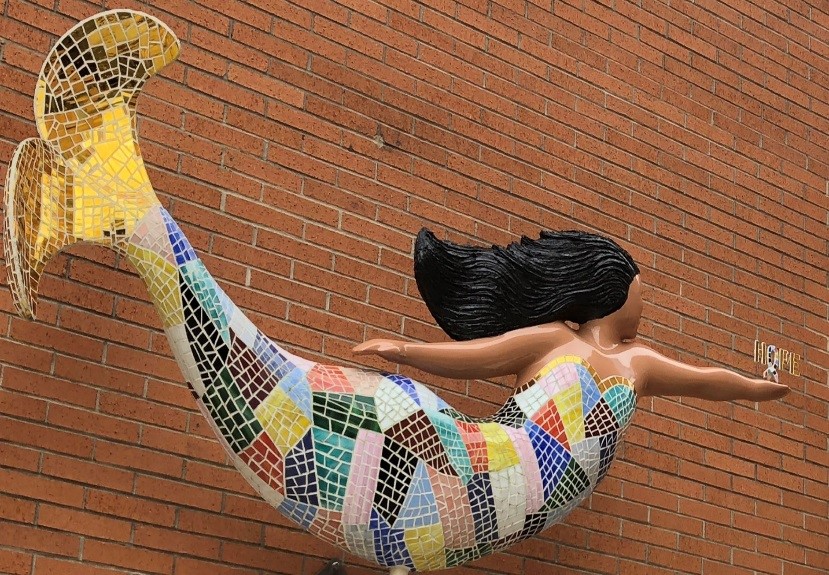Nov 19 2018
Part III – My Continuing Battle with Cancer
Part III of IV
Frederick A. Lubich
III: Spring Songs into Autumn Sonatas – Last Escapades and Final Serenades
November
The days are getting shorter and the nights are getting longer. Some morning, fog is hovering over the water, clouds roll in and the day stays gloomy. But on other days, the sun rises brightly, and the sky turns deep blue, dappled with white popcorn clouds, and the Indian summer sparkles in all its bright and luminous autumn colors.
It is the beginning of November and I am in my third week of radiation. The first side effects begin to show and they are in the words of the radiologist “more acute” than anticipated. The growing sores inside my mouth and my increased incapacity to swallow have made it virtually impossible to speak. And the doctors tell me it will get worse before it will get better although they concede that some of the side effects of radiation might be permanent.
“So now faith, hope, and love abide. But the greatest of these is love”, wrote Saint Paul in his letter to the Corinthians. But if I have learned something this fall, then it is this: Hope and despair, optimism and pessimism are not emotional commodities that can be switched on and off like heating and cooling on an air conditioner. Joy and sadness, light and darkness, come in waves and as November rolls in, the days will grow grayer and grayer. And as far as I am concerned, Rilke’s advice to be ahead of every farewell also holds true when one is faced with one’s own body and its challenges to heal.
If one can hope for heaven, one can also fear the coming of hell, in my case, the realistic possibility that I will never regain the capacity to swallow normally again. Which would mean, that I will never be able to eat and drink again. All right, it would not be quite hell, but it won’t be a picnic either. Forget Manet’s “Déjeuner sur l’herbe” or his “Bar at the Folies-Bergère”. Or closer to home, forget the German pantry, all its handed down recipes along with all its time tested kitchen philosophy, such as …
“Die Liebe geht durch den Magen”, or as the English version reads, “The way to a man’s heart is through his stomach”. It is a proverb, that celebrates the art of cooking for those who you love. Lynne loves to cook and concoct new dishes, but if I can’t eat or drink, forget all that loving preparation, the shared shopping in anticipation of a good meal! Forget all the vegetable growing in spring and the apple picking in fall! Forget all the feasting with family and friends, forget the festive wining and dining of social gatherings. Every toast is a well-meant insult and every “bon appétit” a friendly blow below the belt! And if I am just by myself, thirsty or hungry along the road, forget a fast food burrito or just a cup of coffee to go …
All I have is that same old fake food, going day in and day out through my gastric tube! But if misery and necessity are the mothers of invention, maybe I can give my food supply some psychopathic twist and nurture some sado-masochistic relationship, where the gastric tube could play the sadist and the stomach in turn the masochist. And if this too comes to naught, at least it was some food for thought.
Sometimes I wonder, if all that youthful German “Sturm und Drang” had turned into the American “Storm and Stress”, as the usual mis-translation of this expression goes. After all, it is well-known that stress can cause not only ulcers but also cancer. And as much as I have always enjoyed the stormy part of the equation, the brainstorming and trailblazing of teaching, writing and research, I have also been very stressed out over too many projects the last couple of years. Maybe, cancer was the high price to pay and the final lesson to learn.
What kind of life would that be, where all my higher aspirations have sunk to the lowest of expectations, that is, the desperate hope that I do not aspirate. Who needs dysphagia of all things which means difficulty of swallowing, thereby mixing up trachea and esophagus. The latter can cause pneumonia and – if worse comes to worst – what the medical profession calls exitus. And not to forget, aspiration also describes the initial stage of drowning, which is always something to keep in mind, if one’s home is right next to the water in a flood-prone zone!
Whatever the outcome of all these possibilities might be, the facts are that in my life not only my best dreams have come true, but my worst nightmare too. Who would have thought that I would run out of words, in other words, end up with a tongue that bleeds and hurts, until it was more or less cut out. When I come to think of it, it is a procedure reminiscent of a gone by age, when torture racks where the latest rage and its trials and tribulations were the prize to pay for eternal salvation. My beloved grandfather still was a strong believer that every adversity here on earth was a test and if passed a step on the stairway to heaven.
As a young boy, every Good Friday I suffered with Christ on his way to the cross. Legend had it in those early days that a good Christian would have to be ready to play such a passion play all the way. Years later it dawned on me that there were two kinds of passion plays and God knows as I had already confessed years before, I grew up likening the second version so much more.
Saints used to have a golden glow, at least that’s what Russian icons show. But so often it was their earthly misery, which earned them their saintly radiance. But I already know now, that any good old vibration is so much better than the best of the latest radiation. In short, as long as I am here to stay, I would prefer to be radiant the old-fashioned way. Just as we were on those sunny beaches in Southern California, when paradise was it and the sky was the limit!
“Himmelhoch jauchzend, zu Tode betrübt” is a German expression, for which there is no good equivalent in the English language. It means literally jubilating all the way up to heaven and feeling despondent all the way down to death. In a nutshell, it describes extreme mood swings between ecstasy and agony and is a poetic way of paraphrasing a bi-polar disorder. For the first time in my life, I am struggling not to sink deeper and deeper into that emotional wasteland and its devouring darkness.
This particular underworld has also become known as “Cancerland” which is the title of a medical memoir about cancer. At least, my timing could not have been any better, because the diagnosis of my cancer was perfectly aligned with the month of July, when this book also became the Amazon Best of the Month Book. Not to mention the fact, that the month of July is also the month of Cancer, the fourth astrological sign in the Zodiac. In any case, in that world where cancer rules, there are days, when my struggle seems like such an uphill battle and I feel, all I have left is the end of my rope, some gallows humor and a slippery slope.
A couple of weeks ago, before I became completely mute, I have started to venture onto the nearby campus or even further downtown to see an evening movie but I keep running into colleagues and acquaintances, who don’t recognize me anymore. It is, because I have lost so much weight and also had to shave off my beard for the construction of my radiation mask. On top of it, I always wear now a dark blue cap, which I never did before. An old friend gave it to me and since it says “Navy” in big letters on its front, it probably further adds to the general alienation effect I now have on friends and acquaintances.
“People are strange when you are a stranger …” goes one of the Doors’ darker songs. And when I start speaking in my growling voice, I can’t blame people if they look at me, as if I stepped right out of some old horror movie and gothic story, where the dead keep haunting the living they left behind. This estrangement could actually work both ways, since in those olden days, some dead were rumored to believe that they were still alive, and so they kept walking and talking as if they were still among the living.
This is the dark side of German Romanticism, the twilight zone of spooky Poltergeister and uncanny Doppelgänger. And if I consider the fact that by now I actually could be quite dead, had it not been for some serious medical intervention, then this morbid phantasy could now in deed be my new, alternative reality. But fortunately, that forsaken road I have not taken! Thanks to that magic knife, my doctors were wielding, I am still alive! But then again, on second thoughts, maybe I only think I am?
Anyway, I am happy to tell myself that I am not quite dead yet. And looking at it from this point of view, the picture of my doom loses quite a bit of its gloom. Lightening it up even more is the realization, that despite all my grief, I am becoming Lynne’s daily comic relief. Since my voice has morphed into a droll intonation with undertones of melodramatic exaggerations, I feel quite often that I sound like some village fool from times long gone by. Or maybe even better, like a court jester in a castle up on the hill, amusing his fair lady with fairy tales of storm and stress and knights and damsels in love and distress, who wine and dine the evening away.
On the other hand, there is always the possibility, that I had already my last supper the night before that bloody surgery. Maybe the Grateful Dead from San Francisco were right after all:
“The bottles stand empty,
as they were filled before,
time there was and plenty,
but from that cup no more.”
“The Grateful Dead, “Ship of Fools”
If the party of my life is indeed over, if I have run out of time and if I have run out of words, why keep trudging into the future, where everything drags and hurts? As I progress with my radiation, I feel am losing energy and motivation. And I am also afraid I might lose focus and judgement finishing this narrative. Ever since I had heard King Crimson’s song “Epitaph” in the early seventies somewhere in Southern France, I have been haunted by the refrain of this song “Confusion will be my Epitaph” …
***
But isn’t every end also a new beginning? So let’s forget King Crimson, forget that cancerland, that wasteland of things to come! Let’s go back to the wonderland of our past, let’s channel its dreams and let’s have a last blast. Instead of the questionable Figaro, let’s join the respectable Hidalgo, that noble knight Don Quixote de la Mancha. And you, my Dolce Vita from San Diego could play his Dulcinea del Toboso. Come on, let’s fool ourselves again, just like all those wise men and women have done since way back when. Whether reality or fantasy, you will always be my fair lady, my lady tramp! Remember those windmills out there in La Mancha? That battle clearly was mind over matter! So come on, together we can beat the latter, that latter-day misery, that unspeakable glossectomy. Who needs such rotten realities if you can have fabulous knight errantries!
And don’t forget that kitchen in Heidelberg! And all those wild Walpurgis Nights! Remember that witches brew with which you enchanted me, filling me with all that joy because I was sure you were Helen of Troy. And ever since we drank from that magic potion, we have loved each other with great passion and lasting devotion!
“You got your spell on me, baby,
you got your spell on me, baby”
Santana, “Black Magic Woman”
And that spell has been lasting for almost half a century. In other words …
“We have been together since way back when …
you are the one that makes me shout,
still the one that I dream about …
We’re still having fun!”
Orleans, “Still The One”
The band Orleans was formed in Woodstock, New York in the early seventies and this song is as old as our relationship. So listen, my dear, we are both still here and before we have our final fall, let’s have a last ball, a ball that will last forever! Like those Venetian masquerades, they are by far the best balls for such a time consuming endeavor. And when it comes to those latter-day things, let’s not listen for whom that deadly bell rings! Remember, as long as we are alive, death has to wait out there in the wings.
And last but not least, if we dress in unisex clothing, I bet you that death will be full of loathing, since his work will be more complicated, because, they say that dream-teams cannot be easily separated! At least, that’s what old wives’ tales tell. But God knows what really happens on that slippery slope between heaven and hell! In any case, life is a cabaret and a commedia dell’arte, a dress rehearsal for death, a march funèbre and dance macabre …
This photo reminds me of my grandmother who used to say when I as a little boy became a bit too rambunctious for her: “Deech stech der Hoovr” This Moravian proverb, still stuck in Middle High German, translates roughly into “your oats are pricking you”, meaning that one is antsy for some mischief. My grandmother loved pithy proverbs and playful doggerels and as her grandchild I could easily continue this tradition with words of wisdom such as …
Knusper, Knusper, Knäuschen,
die zwei sind aus dem Häuschen.
If this German nursery rhyme evokes memories of Hansel and Gretel lost in the woods, then this would not be untrue, because there are days and nights, when the two of us feel just as lost in a labyrinth of menacing uncertainties. Only, this time around, we are not caged by an evil witch, but trapped by an inner beast, hungry and eager to devour me in a final feast.
By the same token, I think my lady tramp should also unleash her inner vamp! She could be a rambunctious dancer and trample to death this snake of a cancer. Just like Madonna, our Lady in Heaven once did, standing on the sickle of the moon, stamping evil out all the way down to its underground.
Oh Ma Bella Donna, with all your vivid imagination and your livid indignation, and above all with that fancy footwork yours, you could easily kick in any wall, smash any door and shut any gate, behind which that monster might be lying in wait. I know, you would get a great kick out of it. So you go girl! And while you bounce and pounce, I would be happy to loudly announce our mid- night show right there in Heidelberg in the Whisky a Go Go.
Let’s begin with the Kuhländler “Zigeunerpolka” and then move on to Montmartre in Paris and do the Can Can! You throw up your legs while I speak in tongues! And then it is off to Vienna, from where we waltz down the Blue Danube all the way to the Black Sea, where we could join Glenn Miller’s big-band orchestra, singing and swinging along with its “Moonlight Serenade”. And then lets rave and revel the night away with David Bowie’s
“Let’s Dance”
Let’s sway, while color lights up your face,
Let’s sway through the crowd to an empty space …
Let’s sway under the moonlight, this serious moonlight …”
And while the moon is shining so bright, turning the fall into a midsummer night, and while we are on a full moon roll, dancing away our body and soul, we could team up and tease him, as he is hiding there behind his left and right wing, playing his dirge on his one bony string. I could stick my tongue out at him and you with all your pizzazz could twist and shout: Hello Grim Reaper, come “kiss my ass” …
But knowing this is Goethe’s most famous phrase, you would do it with such an amazing grace, that even death would want to be alive, so that he can court you just like the devil used to do. And I bet you, he would shake, rattle and roll, desperately playing his brittle fiddle, pretending he is on death parole, but little does he know about the art of life and the longing for love, way down here on earth and high above. This Lord of Darkness knows nothing about fun in the sun! This Angel of Death knows nothing about the wings of desire, all he cares about are the dying and stoking their smoldering funeral pyre.
But the bottom line is, he does not know how to rock and roll, all he really can do is counting the dead and their latest toll, which of course he then quickly forgets time and again, because to his constant dismay and lasting distress, he is the Master of Eternal Forgetfulness. As it is, he can’t even remember the difference between May and September, let alone the fact that he is on the other side of the Styx! And Mr. Memento Mori, remember, Styx is not that hard rock band with blockbuster hits like “Don’t Let it End”!
On the other hand, speaking of “Don’t Let it End”, all those of us who are still alive, will always remember, because it is still our best bet:
Rock and Roll is forever!
And it will never forget!
At least that’s what Bob Seger claims on one of his records. And he is right, we all must record the good and the bad, and especially the good before we forget! And then, all the good can become God and Goddess rolled into one. And just imagine, the world would become a divine comedy and sickness and death will be ancient history.
***
“Per aspera ad astra”, that old Roman proverb describes a cosmic trajectory, which one could translate somewhat freely as: “From a world of misery to a realm of stellar glory”. Considering my uphill battle with cancer, I take that Roman view of rising hope any day over the gloom and doom of my slippery slope.
“Stella Maris” Star of the Sea, that is the crowning title of Mother Mary, who as “Mater Dolorosa” had transcended all her worldly misery and ascended to heaven to become the Queen of the Night. In Faust, Goethe converted this Christian imaginary into the Eternal Feminine, who at the end of his play draws his dying hero heavenward. And Mae West, God bless her soul, completed this flight of fancy by proclaiming with her usual thespian flair: “Good girls go to heaven and bad girls go everywhere”.
Et vice versa et nota bene: Mulier est porta diaboli, woman is the devil’s door, opening up to a bottomless floor! During the Dark Ages, some men of the cloth would spread rumors that the beauty of woman, is the work of the devil! And if she was in love and on fire, then the devil was in league with her burning desire. But if one looks at it from a scholarly point of view, none of it can be possibly true.
According to Christian mythology, Lucifer was once an archangel, who as his name already reveals, was carrying the light, before his fall into darkness. But the fact is, the figure of the devil from his horns all the way down to his hooves is nothing but a pathetic parody of the fabulous faun in pagan mythology. Faun and nymph were the natural couple in the Arcadian Paradise, they were son and daughter of Pan and Galatea, the God of Shepherds and the Goddess of the Water, who watched their off-springs quite happily frolicking in the dunes and reeds on the islands off the coast of the Mediterranean Sea.
Oh, how I loved those sunny days and far-away trips, when a beautiful face was enough to launch a thousand hips! So come on, let’s return to that Golden Age, when Homeric visions and Arcadian dreams made the front page of world history! It was then and there that Mother Earth gave birth to her wonderful world of heaven on earth.
À la Recherche du temps perdu! That day dream on the shore of Sète in Southern France, that erotic epiphany became a self-fulfilling prophecy! But how do I know, I was not fooled? Well, first of all, don’t ask, don’t tell! But if you need to know the truth, I can tell you, if beauty comes ashore and push comes to shove, I’ll always be a fool for love!
And on top of it, the options are absolutely foolproof, as far as I can tell. If you can dance with an angel from heaven, who on earth would want to dance with a devil from hell! And for heaven’s sake, you don’t have to go into outer space! All you have to do is look at her angelic face! And if you hear her resounding laughter, that sounds as if it came from far out, then you know it is the laughter of angels when they keep falling off their cloud.
That celestial experience reminds me of the Camino del Cielo, the Road to Heaven, on top of the mountain range along the Pacific Coast from Santa Barbara all the way towards Los Angeles, the City of Angels and hometown of the Doors. Those guys sure knew how to gaze at the stars. And how could we ever forget their magic song “Touch Me”, a song for all seasons, when we would sing and dance and laugh and cry: “I ‘m gonna love you till the stars fall from the sky.”
So come on, let’s go on a ride with the Doors, come join me on their “Moonlight Drive”, and then on with their “Riders on the Storm”! Come on, come on, let’s ride out that disaster storm. And then we will wait on top of the mountain with them, “Waiting for the Sun”. And in the early morning, I will hear you again, your joyous rebel yell from way back when, letting all the world know, that darkness can never win, because all we have to do is let the sunshine, “let the sunshine in”!
Thank God, our Father in Heaven, and thank Goddess, our Mother Earth, that those Dark Ages are gone and that we are still living in the Age of Aquarius. And with its music still in the air, here and there and everywhere, we can breathe till doomsday comes. And don’t forget the good news of the Doors: ”Music is your only friend, until the end”! I could not agree more, especially since she is the one who can show me the way to heaven’s door. All I have to do is track her sound and follow her laughter all the way from down here and up to the hereafter. Because she is my muse, my music, the musical of my life, and she has always known how to enjoy a good jive.
***
Let’s go to your place, let’s go to your place”
Lena Lovich, “Home is Where the Heart is”
Maybe she is playing Beethoven’s “Moonlight Sonata” or maybe even his “Appassionata”. On the other hand, she might also be riffing on Chuck Berry’s “Roll over Beethoven “! Or maybe she is just rocking the socks off Liberace! But whatever she does, she does it … sempre con brio e molto vivace!
“Chi va piano va sano” was never her credo, although it does not mean that those who go to the piano will stay sane. In this case, the Italian saying is about the right pace, in other word: Slow and steady will win the race. So, you go girl, let’s go crazy again! Who wants to stay sane, when you have another chance for life in the fast lane!
But then she seems to shift gear and – oh Mama Mia – begins to cruise into Leonard Cohen’s Hallelujah, until all the angels high up there line up and chime in: “Come up and join us! Where have you been?” And with a triumphant rebel look she continues to play her favorites from the American Songbook, plays Boogie Woogie and Rhythm and Blues and then she tops it off with Bob Seger’s “Old Time Rock and Roll”. Because that has always been the music that soothed her soul, her wandering soul so full of love, of which she gave me more than enough to create a bond that will last a life time and far beyond …
And so she will always be my Songs Over the Waters, my May Songs and my Autumn Sonatas. And when the time has come and the devil’s curse will be again a blessing in disguise and then the two of us will be back in paradise. Because she has always been Goethe’s Eternal Feminine and Eichendorff’s Beautiful Stranger, she has always been my Bella Donna and kindred spirit flying high as a kite, my Lady Madonna and Queen of the Night, and last but not least she will always be my Lady Gaga, my Gypsy Queen, my Black Magic Woman, my fallen …
Blue Angel
and my piano girl
in all the honkytonk bars
and in turn my stairway to heaven
all the way up to the moon and the stars!
Because she has always been my guardian angel,
before she came tumbling down from that heavenly dome,
and she knows her way back just like that rising evening star,
that shines a light on the darkening road, leading us safely all the way home!
***
“Evening Star” is the title of Alphonse Mucha’s allegory, which forms both sides of the three-part tableau above. However, this Evening Star seems to frown, as if she could not face my Blue Angel’s evening gown. But such an illustrious star knows nothing about the Kiss of Death and that it can burn terrible holes into any evening dress. As a result, these hot pants certainly had to be properly patched. But looking at it from the bright side, such this distressed denim hosiery became vice versa the dernier cri of the seventies and their rag-tag fashion industry.
Alphonse Mucha, the creator of the “Evening Star”, was one of the most prolific and popular artists of the international Art Nouveau movement around 1900. This painting is part of a four piece series called “The Moon and the Stars”. Mucha is also the artist of the following mirror image called “Autumn”, which is a part of a four-part series he called “The Seasons”. He was a Czech Moravian and thus belonged to the multi-ethnic and multi-lingual culture of the Austro-Hungarian Empire that saw its last creative flourishing shortly before its final demise after World War I.
Eichendorff’s poetic merging of floral and stellar imagery, most notably in his poem “Mondnacht”, experienced a powerful renaissance in Mucha’s Art Nouveau, where the flowers of the earth easily morph into the stars of the universe. Given such psychedelic transmutations, the expression “far out” had become the favorite exclamation of starry-eyed flower children and tripping hippies from every nation, globetrotting all over the world. And those two soul-mates from the Bohemian-Moravian hinterland of the Old World certainly were some of their earlier seers and singers giving shape to their new sensibility.
Which gets me back on my cosmic sound track. Just like the upward “New Frontier” of the American Dream, the best of our rock stars were always eager to push the horizontal boundaries, beginning with Rolling Stones’ “She’s Like a Rainbow” and Pink Floyd’s “Dark Side of the Moon” all the way to David Bowie’s cosmic disco tunes, with which he took off from planet earth in order to sing and dance with the universe. Which begs the question …
Quo vadis? Sub specie aeternitatis? Where are you going? In view of eternity? When it comes to such latter-day things, we have the same age old answers in stock from ancient Roman times all the way up to the Age of Rock. And we still don’t know anything about life after death, the migration of the soul, our origin and our ultimate goal! The only thing we can hope for and still believe …
“Knowledge comes with death release”
David Bowie “Quicksand”
***
“Gypsies, Tramps and Thieves” is a song by Cher who is also one of Lynne’s great idols, not only because she is a great singer and performer, but also because of her strong sense of independence and fashionable flamboyance. This particular song also resonates with our own nomadic realities and phantasies. Looking back at our itinerary, our life together also falls more or less into three gypsy stages. The first two stages played out to the tune of the gypsy fiddler and gypsy scholar, whose artistic aspiration and professional realization represent and reflect to varying degrees the merging of our two biographies.
Our third stage could be described by our current situation, where everything seems to be in more or less chaotic transition. This is most evident in our preparation at the beginning of this year, to make major renovations to our house from the kitchen all the way up to the top floor. These attempts have been upended by my cancer, and now we are stuck with emptied or rearranged rooms and numerous boxes which keep cluttering the floors, creating the impression that we are sort of camping out in our own house if not getting ready to decamp altogether and hit the road again.
Cher’s vagabonds certainly would feel at home in such a makeshift place with so much up in the air, and I certainly do too, especially since also the garden adds to that transitory camp atmosphere with all its fluttering laundry. The latter we had to hang out on lines in the garden, because one of the several appliances that broke down in the course of the year was the dryer. To round out this world of outcasts, as Cher’s song describes her gathering of gypsies and tramps, the thieves would have to be brought in too.
Since I need a gallows reprieve, I would be happy to play the role of that thief. Because I am afraid to run out of time, I would certainty try to steal some more, and if it just every day a tiny bit in the hope that it would add up and that I could get away with it. But as is well known, time itself has been on the run from the beginning of time! The only way to catch up with it – or at least to slow it down if not to make it stay – would be trying to run the opposite way.
***
“Memory is the only paradise
from which we cannot be driven.” Jean Paul
November is the month of Thanksgiving. There is no doubt, we have reached the autumn of our lives and it is high time for our thanksgiving, for our gratitude for the plentitude we have received from Mother Earth and her children. O my sunny California Girl, you have been the sunshine of my life! And as I look back, the lights and highlights of our lives shine even brighter. It is the same feeling one has after all long day at the beach and the glowing continues way into the night. I think now is the time, that we both catch all the rays we can get and turn the last stretch of our road into a Sunset Boulevard and its dead end into a festive Holiday Inn. And then enjoy the remaining light and the twinkling twilight before all that darkness sets in.
From the Romantic Road out of the Hohenstaufen Wood all the way to Sunset Boulevard in West Hollywood! Oh my flower girl, how I remember all our May Songs from the spring time of our love! And now they are all returning as Autumn Sonatas. Look and listen, the crisp autumn air is full of sparkling flashbacks and crackling soundtracks and I happily agree with Jim Morrison’s song, because he sings also about you, my girl from the water …
“I found an island in your arms / a country in your eyes.”
The Doors, “Break on Through to the Other Side”.
From the West Coast to the East Coast, from Southern California to the island of Manhattan and all the way down to Southern Virginia, in other words, from sea to shining sea, you made my American Dream a sparkling reality. And it was ultimately you, who opened all the doors to a world of possibilities, in which my Old World phantasies could turn into the New World realities.
Had I stayed in Germany that could have never become a reality. In other words:
“You make me real,
you make me feel like lovers feel …
So let me slide into your tender sunken sea,
you make me throw away mistaken misery.”
The Doors, “You Make Me Real”
In the olden days, they cut out your tongue, when you were a convicted liar. So there must be some kind of mistaken identity, because I have always aspired to that truth which John Keats in his ”Ode on an Grecian Urn” had so memorably defined as “beauty is truth, truth beauty” And this is the absolute truth:.My girl from the sea has turned my life into poetry and our love into a romantic comedy! And now, our memories are becoming more and more nostalgic elegies, triptychs along our long and winding road.
“I’ve been to Hollywood, I’ve been to Redwood,
I’ve crossed the ocean for a heart of gold.”
Neil Young, “Heart of Gold”
I am coming to the end of this sentimental journey in search of things past, the hot and humid summer months of July and August have turned into the cooler days of the fall. As I sit in our garden, the leaves are tumbling down, forming a lush carpet of red and yellow on the ground. And when there is a breeze in the air, one can hear the waves of the nearby water gently rushing ashore.
Thanksgiving is the meaningful holiday for people around the world, since it invites all religions to participate in the festivity of gratitude. One of the many tradition in Heidelberg is the yearly “Heidelberger Herbst”, celebrating the harvest of its farmland around the city. The avatar of all goddesses associated with the abundance of the earth is the Alma Mater, the Roman goddess of knowledge and nourishment. During the Renaissance, she was depicted holding a cornucopia or a big bowl filled to the brim with fruits. And quite often she was surrounded by other mythological figures taking part in the festivities.
Kore means maiden in ancient Greek. She is however better known as Persephone, the daughter of Demeter, who was worshipped in antiquity as the “Doorway of the Mysterious Feminine”. Persephone was adored as the goddess of eternal spring and in Renaissance art, she was often portrayed with flowers in her hair. In celebrating the fertility of Mother Earth, she glorifies the magic cycle of death and rebirth, the flowers of spring and the fruits of fall, the four seasons in all their natural beauty, dancing in perfect harmony with Antonio Vivaldi’s Quattro Stagioni.
And how they all tried to catch that smile, that angelic smile of La Gioconda, from Leonardo da Vinci’s Mona Lisa and Sandro Botticelli’s Prima Vera to Giacomo Puccini’s Golden Girl of the West. But I think my Bella Donna caught it best. And from a musical point of view, no serenade could have captured her elusive soul any better than “Mona Lisa” by Nat King Cole:
“Are you warm, are you real, Mona Lisa?
Or just a cold and lonely loving work of art?”
Nat King Cole, “Mona Lisa”
Art versus life and life as art in search for a golden heart! Nothing but far-out phantasies? Fact is, ever since I had met my Gioconda from California, my Golden Girl from the West, she kept taking me on youthful flights of fancy. In one of my lonely nights after I had left her behind in the Old World, I wrote the poem “An eine Nymphe”. It describes in seven stanzas a nymph’s spirited flight from antiquity all the way to modernity and how I could feel her already in the love songs of ancient Greeks and Romans and Spanish Moors, those medieval troubadours, whose verse in turn inspired Petrarch’s poetry in praise of female beauty, spanning the arc all the way into modernity. The last two stanzas of my poem are part of this trajectory trying to catch some fleeting glimpses of her on her transatlantic journey to rejoin me in the New World.
“So habe ich dich in Wien, Paris und Amsterdam gesehen,
in Cafés, auf der Champs Elysee und in alten Grachten in Brabant,
doch erst als du von der Gangway in New York City in meine
Arme gelaufen – hab ich wieder die Nymphe in dir erkannt.
Ich fühle dich wieder im Traum eines arkadischen Hirten,
der sanft und heiter an meine Schläfen schlägt,
und ich sehe dich in den Armen eines glücklichen Fauns,
der in meinem Herzen nach seinen Wurzeln gräbt.“
This poem was published in the German poetry magazine Cimarron in June 1978 and it was one of my last poetry publications in Germany, before my academic future in America began to completely preoccupy me for the next quarter of a century. I was tempted to translate those two stanzas, but I fear I would probably lose rhyme and rhythm and so I prefer to leave them untranslated. After all, every translation is a form of treason, or as the Italians would say “traduttore, traditore.”
O Sole Mio, o Amore Mio, o Ma Bella Luna Dell’Acqua! How does one translate such sound cascades without betraying their mellifluous melodies? Everything has its rhymes and rhythms! Every life has its inner melody just like every season unfolds in songs, sonatas and symphonies. And as words fail, they can become words on wings rising high above the silence of any metaphysical poet or clairvoyant prophet.
And as I look up through the falling leaves, into a deep blue autumn sky, I remember Kurt Weill’s “September Song”. Like no other composer of the Weimar Republic, who was driven into exile, he had enriched the musical repertoire of modern music, from the stages of Berlin and Paris all the way to the Broadway in New York. This song he had composed in New York for a Broadway musical shortly before the outbreak of the Second World War, complementing Maxwell’s lyrics with a deeply felt melody.
Throughout the years, this song has never failed to move me to tears. And now I also know the deeper reason for it. It is Rilke’s adage ”be ahead of every farewell”. Looking back on the many years the two of us have spent together, I have come to the realization that this current year crystalized into something like a summary of our itinerary. It was in May, when I first felt that my tongue cancer had returned but at that time it was misdiagnosed as a mere ulcer. It was not until the following fall, that Weill’s “September Song” sounded more and more like a travel log about the last months of our journey, maybe even like a Kassandra call, a musical writing on the wall. In any case, in the last months, Kurt Weill’s melody kept welling up in me with a growing elegiac intensity.
“It is a long, long while / from May to December,
and the days grow short / when you reach September …
And the days turn to gold / as they grow few,
September, November / and these few golden days …
these few precious days / I’d spend with you,
these precious days I’d spend with you.” Kurt Weill, “September Song”
***
Epilog
“Death be not proud”
John Donne
Soon December will arrive and winter will be here with all its snow storms and freezing winds raging through cities and countryside. That is the time when Mother Nature appears to be dying too and Death seems to be emboldened to claim his victory. And in one of these coming Decembers, probably sooner than later, he will knock on my door, telling me with his usual pride that my time has come to cross over to the other side.
But then, I will tell him that it is my true perception and romantic conviction that in reality he is knocking on heaven’s door and that from now on I really don’t need him anymore! Because when I have finally run out of breath, my loved one will be my angel of death. She will rise like a blue angel out of the water and shine like a rainbow across the sky, hover for a while over some evening clouds and then she will join me again and together we will forever be a transatlantic reverie of …
colorful flowers and sparkling stars,
a dream team in heavenly harmony,
two free spirits and wandering souls
in a timeless rock and roll phantasy.
Alphonse Mucha, „Combinaisons Ornamentales“
Part I and Part II of My Continuing Battle with Cancer
Bildnachweise:
- Der geigende Tod auf den Seitentafeln zu dem narrischen Tanzpaar ist Teil eines Bildes von Alfred Rethel mit dem englischen Titel „Death as an Avenger“ (1851) aus William Vaughan, German Romantic Paintings Yale, University Press, 1980. S. 236
- Die allegorische Dame auf den Seitentafeln zu Lynne am Klavier ist von Alphonse Mucha, trägt den Titel „Evening Star“ und ist aus der Serie „The Moon and the Stars“ (ca. 1900) aus Rosalind Ormiston, Alphonse Mucha, Masterworks, New York, Metro Books, 2007, Seite 191
- Die allegorische Dame auf den Seitentafeln zu Lynne mit der Fruchtschale ist von Alphonse Mucha, trägt den Titel „Autumn“ und ist aus der Serie „The Seasons“ (1897), ibid. Seite 105
- Die Graphik mit den Sternen am Ende des Textes ist ebenfalls von Mucha und ein Detail aus seiner Serie „Combinaisons ornamentales“ (1901), ibid. Seite 79.


